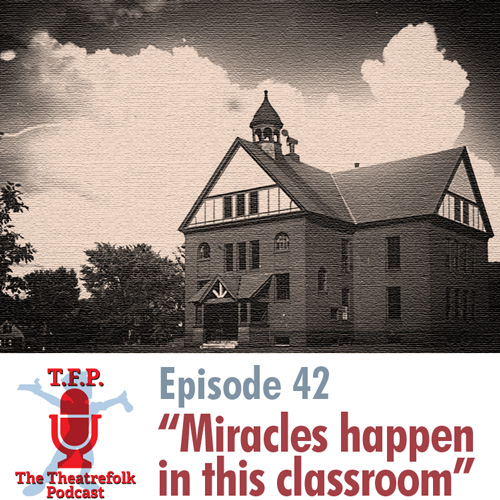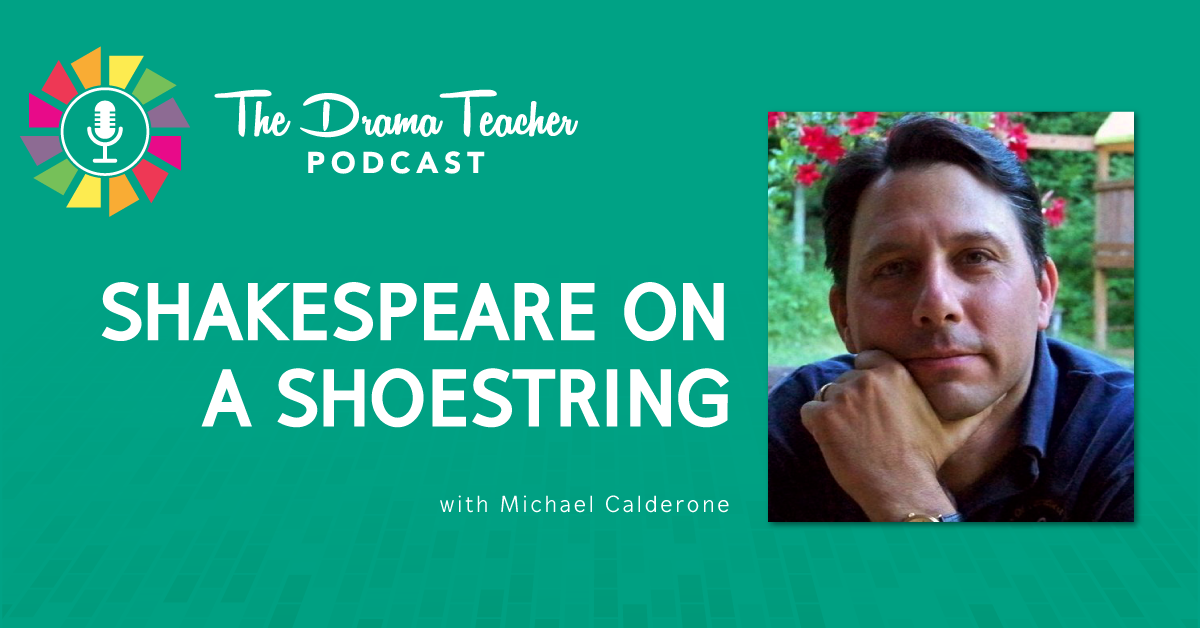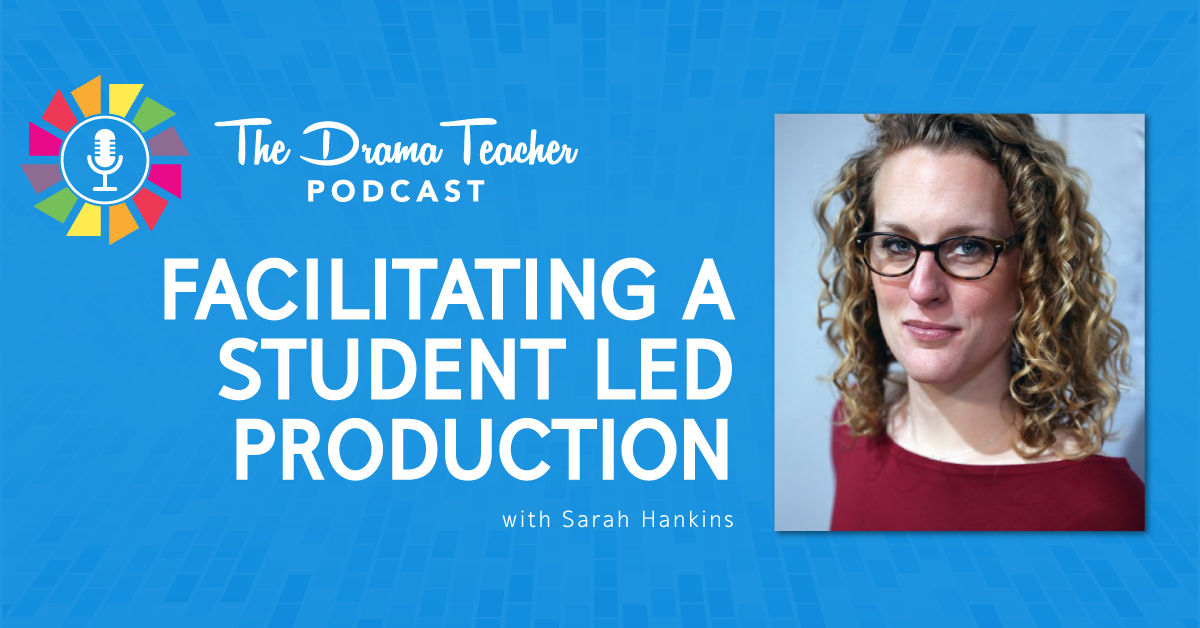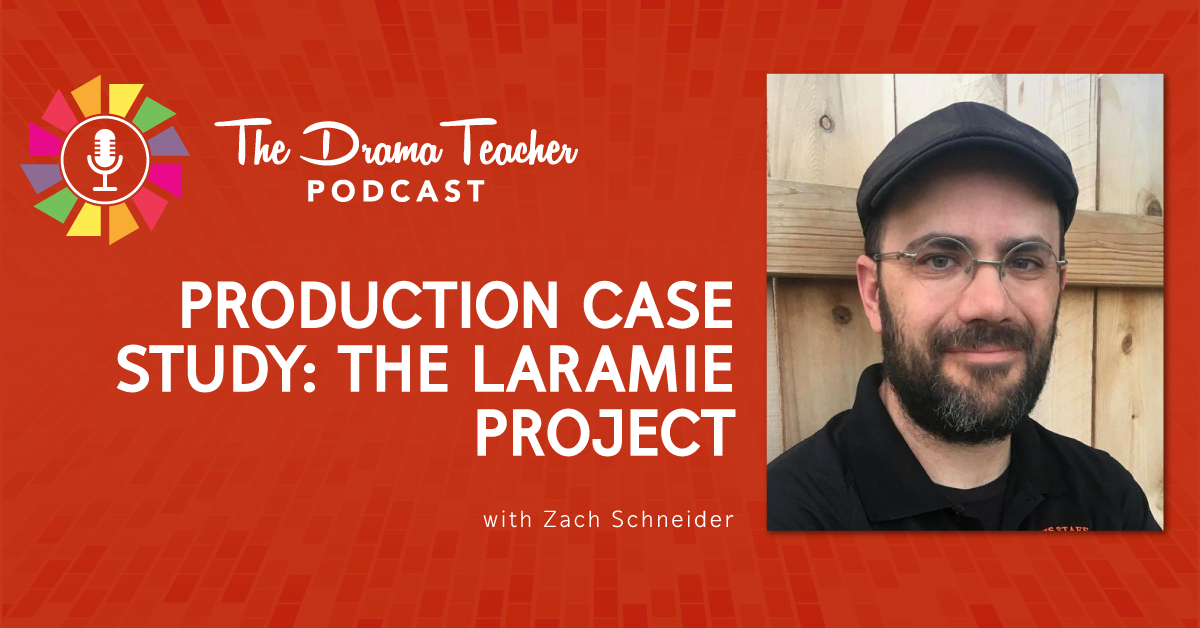Miracles Happen in This Classroom
Episode 42: Miracles Happen in This Classroom
Lindsay talks to drama teacher Tracy Garratt about the difference between drama and theatre in the classroom.
Show Notes
- What should we do when we hit 10,000 likes on Facebook? Tell us here!
Subscribe to The Theatrefolk Podcast
Episode Transcript
Lindsay Price: Welcome to T.F.P., the Theatrefolk Podcast. I am Lindsay Price, resident playwright for Theatrefolk. I hope you’re well. Thanks for listening.
Today we’re going to talk about the difference between theater and drama in the classroom. But first let’s do some Theatrefolk news. I have to say I am pretty jazzed at what’s happening over on our Facebook page. I think there’s like cool stuff going on. First of all we have hit over 7,800 followers, fans, likes. Whoever you are, we adore you because that is a lot of people who don’t personally know us, hanging around, reading our posts, putting up their own posts. I just think that’s pretty cool. It also means that we’re closer to 10,000 than farther away. We’d like to hear what you think we should when we hit that pretty cool number. Right? I remember when Craig and I started with the page, our goal was 1,000 followers or likes or fans or whatever. We were excited about the idea that we could hit 1,000. An now, we’ve come again so much closer to 10 than not, so go over to our Facebook page. Make sure you’re following along. That’s where we post pictures, we celebrate productions. We post drama and education articles. It’s where free play Sunday happens, last Sunday of every month, free scripts. It’s where you can find our blog posts and podcasts. Everything in one tidy little place. It’s a lovely hub of high school theater. I just think it really does represent who we are as theater folk, who we want to be, how we want to reach out, how we want to be in our little community, our little drama geek community. I love it. Lastly, where oh where can you find this podcast? We post new episodes every Wednesday at theatrefolk.com and on our Facebook page. Facebook. And Twitter. You can find us on the Stitcher app and you can subscribe to TFP on iTunes. All you have to do is search on that word. What’s the magic word? Theater Folk.
Episode 42. We’ve got a teacher interview. Today, I’m talking to a drama teacher, Tracy Garratt. I have been visiting Tracy’s classroom for three years now. Oh my gosh. I have taught play writing, I’ve work-shopped some plays, and we’ve had many conversations about what’s it like to teach high school drama, what the difference between drama and theater is when it comes to the classroom. What does it mean exactly, what does it mean when we look at drama and we look at theater as it is specifically applied to education, to what happens between a drama teachers and drama students. From my perspective, what Tracy and I are talking about comes down to skill sets and outcomes. In the theater classroom, students learn a skill set that will improve their performance on stage; projection, articulation, character analysis, physicalization, all of which are driving towards production. That’s the outcome, to produce a play. In the drama classroom, students learn a skill set that will improve their performance in life: improvisation to develop self-confidence, articulation that relates to being able to speak clearly in a job interview. The outcome here is more process driven. There may be a production, there may not. Tracy has her students moving towards some kind of public performance but it’s never really the driving focus of her classroom. Between the two skill sets, it’s the same tools and the same classroom but with pretty decidedly different outcomes. Of course in the theater classroom, the skillset can also apply to the stage and to life, it’s just a matter of the direction of the class. Performance or process. Let’s get to the interview. So, I am sitting here on the floor of the drama classroom of Tracy Garratt. Hello Tracy.
Tracy Garratt: Hi there.
Lindsay: ` We’re going to talk shop mostly about the difference between drama and theater. How long have you been a drama teacher, Tracy?
Tracy: I’ve been teaching drama since I started 13 years ago.
Lindsay: 13 years. Did you set out to be a drama teacher?
Tracy: No.
Lindsay: I thought so. You started off…
Tracy: I started off thinking I was going to be an English teacher, and maybe do some social studies kinds of things. That’s where my degree comes from. I was doing my second teaching block at a high school and one of the teachers was going to go on maternity leave and she said, “Oh, Tracy would be good in here.” And I said, “No, I don’t know anything.” She said, “No, no, no. You’ll be fine.” And literally just threw me in there and I had to start from scratch with no knowledge whatsoever. Zero. What a learning curve. I fell in love with it.
Lindsay: You learned. Trial by fire. You fell in love with it. What did you fall in love with?
Tracy: I think what really hooked me was that we were exploring concepts in a very unorthodox way. It really turned my definition of what teaching is upside down. I realized that this was the way we were going to get kids, this was the way. I love literature, but this is the way you’re going to have other kids loving literature. I just knew, I knew this is awesome. Let’s do more of this. So, I started to get some knowledge and some formal training and it’s been…
Lindsay: And 13 years later, here you are.
Tracy: Here I am.
Lindsay: You haven’t always been at Eastdale?
Tracy: No, I’ve been at Stamford, I’ve been at Myer. I did a stint at Kernahan Park, and then I ended up at Eastdale.
Lindsay: How long have you been here?
Tracy: I think this is my 7th year.
Lindsay: Let’s say seven.
Tracy: Yeah. It’s crazy.
Lindsay: I’ve been coming into your classroom … I’ve been trying to think, I came in the fall of 2010, and now we’re in the spring of 2013. You and I have had many conversations, a lot about just what it is that happens in the drama classroom, and when is it most effective. You work in a district that has a lot of schools that sort of focus on the performance aspect, would you say?
Tracy: Yeah, I would think so. When I first started really teaching drama and having the bulk of my teaching day be drama classes, I was going to drama centered councils and meeting all these drama teachers. I was really excited to learn from these people. I found myself feeling very on the outside of the conversation mostly because my inexperience was very palpable. I could really feel how different I was from the other teachers because they had put on lots of performances, they had lots of experience with that and the focus was very clearly on the product. I thought, ‘Okay, I have to focus on the product.’ The more that I went and did some coursework for myself and learned with various different professors, the more I realized that I wasn’t really into the product. I think the product is a great side effect [inaudible 09:19] the work. I enjoy the product as any theater person would, but for me what’s really important and what’s really going on is how did we get to that product. So, it’s the process. I feel that the process is in and of itself a product.
Lindsay: Do you think that, in a nutshell, is what the difference is between teaching drama and teaching theater?
Tracy: I think so, for my personal self. I think whenever anybody asks me what I do, I say, ‘I’m a drama teacher, but not a theater teacher.’ Then I explain to them what I think the difference is between those two concepts. A theater teacher is someone who is teaching acting techniques and vocal warm-ups, and the goal is the product.
Lindsay: Things that are going to improve the product.
Tracy: Yeah. What it’s going to look like on the stage. The final goal, which is this great performance. That’s awesome stuff and anybody who does that is amazing.
Lindsay: It’s a different skill set. The skills that go into performance, they’re life skills too. How we communicate. But, it’s a different skill set. Then, what are you doing?
Tracy: What I’m doing, at least what I see the difference is that as we go along towards a product, we’re talking about things like ‘Why would we make these decisions?’, ‘Why would be use this tone of voice instead of that tone of voice?’, “Why would be choose this piece of music over that piece of music?’, ‘How did it make me feel?’, ‘Where would I use these skills in another area of my life?’
Lindsay: That’s a really important one, isn’t it? That it’s really connecting what’s happening in drama class to what’s happening in their life.
Tracy: Yeah, because I’m under no illusions that any of my kids are ever going to become Brad Pitt or Angelina Jolie. If I ever have one of those people, it won’t be because I ever imparted upon them some great piece of knowledge, it will be because they are skilled, talented, creative people and they came to me and I was lucky to have them in my room. I think that what I’m really doing with my kids is preparing them for the real world, preparing them to do everyday average tasks like being in a relationship or raising kids and working in an environment with people that you maybe don’t have a lot in common with, or you don’t enjoy them. That’s what I’m teaching my kids in my class room.
Lindsay: How do you do that in a drama context?
Tracy: Mostly through analyzing the things that we do in class. I want to specify that it really is about the analyzing, it is about the reflection. Reflection is a major component in the drama classroom. What you’re doing is you’re making decisions with the kids and the kids are making their own decisions creatively. What I highlight is ‘Why did you make that decision, and if you had made a different decision what impact would it have had on the work?’ And, let’s try out that other decision. I think that’s really key to being able to live in the world with other human beings.
Lindsay: Other people, yes. I think very specifically, what’s the class that we just finished? What are they called? School to Work. It could be so easy for these kids to just shut down and just live within themselves, right? Because they’re not going to go to college.
Tracy: Probably not, they might, but it may not happen for them right away. It might be something that they achieve 10 years from now, but it’s not something that they will probably do right away out of high school. They’ll most likely get a job right away.
Lindsay: I have to say, because I was here and I’m workshopping a play this week, I just think that a drama class like this it seems to be vital for these kids. Where else are they going to learn communication skills? And yet, this is sort of an anomaly that they have this, isn’t it?
Tracy: Yeah. It is kind of sad in a way. I remember when I was in school, not so long ago, we actually had diction class.
Lindsay: Oh my gosh.
Tracy: Yes, Voice and Diction. And Mrs. Wood was teaching that along with typing for the girls, especially.
Lindsay: I had typing. I was one of the last classes that used a manual.
Tracy: Isn’t that crazy?
Lindsay: Not so long ago, it really wasn’t.
Tracy: We had those opportunities when we were in school. It was important to speak clearly and articulate. They really worked on presentation skills and how you would present yourself to an interview, for example, or to a group of people who were analyzing your product or whatever. But we don’t have that really in school anymore, but we do that in drama class. People don’t realize that, that’s what we’re doing every day.
Lindsay: Pretty much.
Tracy: It’s really key. I think it’s really important for all students. I wish it was a mandatory course. I wish it was mandatory every year for all students because the stuff that we do in this class is invaluable. I don’t know how we can explain that to the general public, but this class … you don’t have to be a star, you don’t have to be even comfortable on stage, what we’re teaching is that you can look at something from various perspectives, make a decision about what works well and what doesn’t. The idea that a decision is, you know, you can always make another decision. That’s so important.
Lindsay: And then to reflect on it to actually formalize an opinion, ‘This is why I think this.’
Tracy: And be able to back yourself up because you’ve got experience, you’ve played it out in this classroom. That’s the other thing too. Play is so important in the learning of all people, not just little kids, all people. We need to play. I think that’s how we’re going to engage students, future students. Everything is game-ified now.
Lindsay: The saddest thing is that there are these studies that happen: What do you most value in a worker? I value creativity and independent thinking. What are the two things that we have basically taken out of school? Creativity and independent thinking.
Tracy: Yeah, because here we have developed all these rubrics, so basically we’re telling the kids what it is that we expect. A rubric is a great thing. Sometimes it helps kids to achieve to a certain level of expectation, but also a rubric takes out any question of what we could do creatively on our own because I have to meet these expectations that the teacher has set forth. The thing about a drama room is that there’s not always a rubric for how you interact with a person who’s blind or a person who finds themselves pregnant and they aren’t prepared for that. There’s no rubric for that. Human interaction? There’s no rubric because it’s going to be different each time. I don’t know. It’s just an amazing thing. Miracles happen in this classroom, really.
Lindsay: I see it all the time. Just in terms of somebody’s self-confidence. Somebody who gets it.
Tracy: Two girls in this classroom that were just playing it this week, these two kids, they don’t speak clearly. They are very quiet. They’re like tiny little mice, and I said, ‘Girls you have to speak clearly. I want to hear your voices. We’re going to work on you developing an authoritative voice so that you can get your needs met.’
Lindsay: Who’s going to speak for them in the world?
Tracy: Yeah, they need to speak for themselves. So, that’s what we’re working on, and it’s coming. I can actually hear them speak and they’re offering ideas now. Not regularly, but they are doing it.
Lindsay: That’s all that really counts. Sometimes it just takes time, it takes time. You have to go.
Tracy: I do.
Lindsay: You do. That’s fine.
Tracy: Thank you.
Music credit: “Ave” by Alex (feat. Morusque) is licensed under a Creative Commons license.



